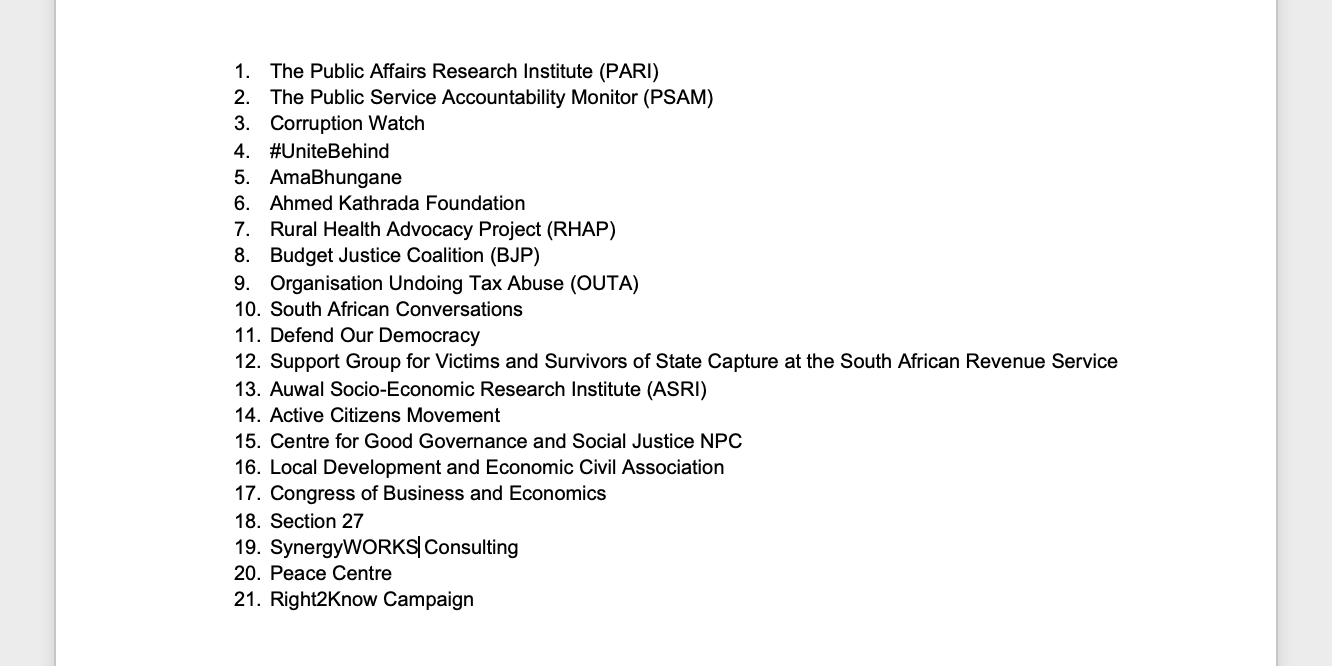Statement drafted by members of the Procurement Reform Working Group (PRWG). The PRWG was formed in 2020, in response to a sense from experts in the field of procurement reform that a unique opportunity to coordinate efforts for civil society advocacy had emerged.
PRESS STATEMENT
Wednesday 22 March 2023
As civil society organisations dedicated to building an accountable, democratic and capable state, the government’s new disaster management regulations are cause for alarm. The electricity crisis is destroying the livelihoods of our people. We believe that urgent action is needed to address it. The new emergency procurement provisions, however, threaten more corruption and inefficiency.
The crisis is the government’s own doing. It is depressingly common for emergency conditions to be actively created, only for officials to abuse emergency procedures to enrich themselves and the tenderpreneurs. The COVID-19 procurement scandal laid bare, for all to see, how ready some officials are to turn popular sacrifice and suffering to their own advantage.
The Ramaphosa administration must understand that another round of looting could irreparably undermine its legitimacy. To prevent this, the new electricity disaster management regulations provide for monthly publishing of emergency purchases, and real-time monitoring by the Auditor General. But the regulations are too broad, they’re extremely vague, and limited when it comes to transparency.
The undersigned civil society organisations call for improvements in the following directions in order to avoid further abuse of public procurement. These can be achieved through amending the regulations, and by specifying them in Treasury instructions.
In the first place, it appears from the regulations that all state institutions are now freed to pursue emergency procurement in an astonishing variety of open-ended situations. They can do so to increase electricity generation capacity, to maintain critical infrastructure, to keep specific essential services running, but also to minimise the impact of load shedding on livelihoods, and effectively anything else. In such expansive terms, any reasonable relation between emergency conditions and procurement procedures is lost. This is a licence to plunder. It can be a cover for every imaginable scheme.
Second, and relatedly, it is worrying that the regulations appear to provide unlimited discretion to the executive. Section 5 (1) of the regulations, for instance, provides that Cabinet ministers can issue directions, as required, within his or her mandate. This is a flaw we have seen result in misuse of procurement processes by ministers in the recent past. It involves an extremely broad expansion of executive authority, which rubs against the checks and balances of our Constitutional framework.
In addressing these concerns, we argue that the ambit of the disaster management regulations as they pertain to emergency procurement must be far more clearly and narrowly stipulated. They should include only those circumstances in which emergency procedures can be clearly specified and publicly justified. Similarly, the powers of ministers should be constrained, to remain within a set of strictly circumscribed situations, reasonably related to the crisis before us.
Third, it is not enough for the disaster regulations to vaguely gesture toward monthly publication of emergency purchases. The Constitution requires transparency in government procurement. Civil society has repeatedly expressed to the government what is needed by way of transparency and has noted the shortfalls of the publication process under the COVID-19 emergency procurement rules.
In today’s data-based world, proper procurement monitoring requires proactive disclosure of a series of specific data points. These must include a written justification for the emergency procurement in question. Transparency must extend to the details of the supplier contracted, including the identities of its managers, its legal owners, and its beneficial owners. Publication must cover the description, technical specifications, and the quantity and price of procured goods and services. It must include the contract, delivery schedule, invoices, and the results of inspections upon delivery.
All these details must be put on a central online portal that is easily and freely accessible, that enables tracking of data across the whole of a specific procurement process or system, and that is machine readable. In the past, certain institutions have simply failed to report procurement information, which justifies strong provisions for sanctioning the leadership of these institutions now.
Finally, the government also has the power to introduce enforcement measures beyond transparency. Certain suppliers should not be allowed to participate in procurement, including those managed, owned, or which go on to benefit public office bearers, party leaders, and officials and advisors in ministries and public administrations. Moreover, whistleblowers should be encouraged with enhanced protections and rewards. In the context of emergency procurement, rewards should especially be applied to cases of invoicing fraud and under-delivery.
There is a serious case to make that a state of disaster is unnecessary and inappropriate to the electricity crisis that we face. It is the government who has allowed this problem to fester. The existing procurement legislative framework has not been optimised in ways that move urgent processes forward. If through loose provisions around emergency procurement, the state of disaster now gets made a pretext for looting, trust in government will be irremediably harmed. The Ramaphosa administration should heed civil society’s call now.
For queries contact: Ryan Brunette (ryanb.research@gmail.com) / Zukiswa Kota (z.kota@ru.ac.za)
Endorsed by:
- The Public Affairs Research Institute (PARI)
- The Public Service Accountability Monitor (PSAM)
- Corruption Watch
- #UniteBehind
- AmaBhungane
- Ahmed Kathrada Foundation
- Rural Health Advocacy Project (RHAP)
- Budget Justice Coalition (BJP)
- Organisation Undoing Tax Abuse (OUTA)
- South African Conversations
- Defend Our Democracy
- Support Group for Victims and Survivors of State Capture at the South African Revenue Service
- Auwal Socio-Economic Research Institute (ASRI)
- Active Citizens Movement
- Centre for Good Governance and Social Justice NPC
- Local Development and Economic Civil Association
- Congress of Business and Economics
- Section 27
- SynergyWORKS Consulting
- Peace Centre
- Right2Know Campaign
ENDS.


